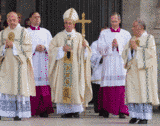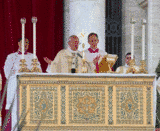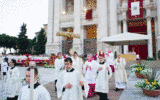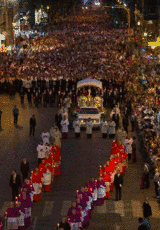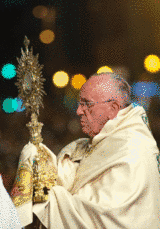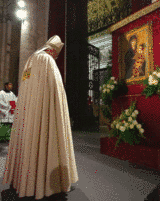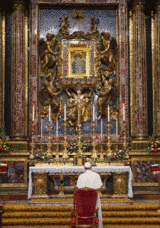Solemnity of Corpus Christi 2015
(Papa Francisco's homily begins at 29 mins 5 secs on the video)
Pope Francis's Homily at Mass in the Piazza of St John Lateran Basilica
before Adoration of the Blessed Sacrament & a Eucharistic Procession to the Basilica of St Mary Major
Thursday, 4 June 2015 - in English, French, German, Italian, Portuguese & Spanish
"We heard: how at the [Last] Supper Jesus gives his Body and his Blood through the bread and wine, to leave us the memorial of his sacrifice of infinite love. And with this “Viaticum” filled with grace, the disciples had everything necessary for their journey through history, to extend to everyone the Kingdom of God. The gift that Jesus made of himself, by his voluntary immolation on the Cross, will be light and strength for them. And this Bread of Life has come down to us! The Church’s amazement at this reality is unending. An astonishment which always feeds contemplation, adoration, and memory. This is shown to us by a really beautiful text from today’s Liturgy, the Responsory to the Second Reading from the Office of Readings, which reads: “See in this bread the body of Christ which hung upon the cross, and in this cup the blood which flowed from his side. Take his body, then, and eat it; take his blood and drink it, and you will become his members. The body of Christ is the bond which unites you to him: eat it, or you will have no part in him. The blood is the price he paid for your redemption: drink it, lest you despair of your sinfulness”.
There is a danger, there is a threat: to have no part in him, to despair. What does it mean today, this “to have no part in him” and “to despair”?
We have no part in him when we are not docile to the Word of the Lord, when we do not live in fraternity among ourselves, when we compete for first place — climbers — when we do not find the courage to witness to charity, when we are incapable of offering hope. This is when we have no part in him. The Eucharist enables us to abide in him, for it is the bond which unites us to him, it is the fulfillment of the Covenant, the living sign of the love of Christ who humbled and lowered himself in order that we remain united. Participating in the Eucharist and being nourished of him, we are included in a journey which admits no division. Christ present in our midst, in the sign of the bread and wine, demands that the power of love overcome every laceration, and at the same time that it also become communion with the poorest, support for the weak, fraternal attention to those who have difficulty in bearing the weight of daily life, and are in danger of losing their faith.
And then the other phrase: what does it mean for us today to “despair”, or to water down our Christian dignity? It means allowing ourselves to be undermined by the idolatries of our time: appearances, consumerism, egocentrism; but also competitiveness, arrogance as a winning attitude, never admitting to mistakes or to being in need. All this leads us to despair, making us mediocre Christians, lukewarm, bland, pagans.
Jesus poured out his Blood as the price and the laver, so that we might be purified of all sin: not to lose hope, let us look to Him, drink at his font, to be shielded from the risk of corruption. Then we will feel the grace of transformation: we will always be poor sinners, but the Blood of Christ will free us from our sins and restore our dignity. It will free us from corruption. Not by our merit, with sincere humility, we will be able to bring our brothers the love of our Lord and Saviour. We will be his eyes which go in search of Zacchaeus and Mary Magdalene; we will be his hand which soothes those who are sick in body and spirit; we will be his heart which loves those in need of reconciliation, mercy and understanding.
Thus the Eucharist fulfills the Covenant which sanctifies us, purifies us and unites us in worthy communion with God. Thus we learn that the Eucharist is not a prize for the good, but is strength for the weak, for sinners. It is forgiveness, it is the Viaticum that helps us to move forward, to walk.
Today, the Feast of Corpus Christi, we have the joy not only to celebrate this mystery, but also to praise it and sing it through the streets of our city. May the procession we will make at the end of Mass express our gratitude for the whole journey that God has made us travel through the desert of our poverty, to deliver us from servitude, nourishing us with his Love through the Sacrament of his Body and his Blood.
Soon, while we walk along the street, we will feel we are in communion with so many of our brothers and sisters who do not have the freedom to express their faith in the Lord Jesus. Let us feel united with them: let us sing with them, praise with them, adore with them. And let us venerate in our heart those brothers and sisters of whom the supreme sacrifice was demanded for faithfulness to Christ: may their blood united with the Lord’s be a pledge of peace and reconciliation for the entire world.
And let us not forget: “The body of Christ is the bond which unites you to him: eat it, or you will have no part in him. The blood is the price he paid for your redemption: drink it, lest you despair of your sinfulness”."
Papa Francesco's words at the Angelus in St Peter's Square
Sunday, 7 June 2015 - in Arabic, Croatian, English, French, German, Italian, Portuguese & Spanish
"Dear Brothers and Sisters, Good morning!
Today in many countries, including Italy, we celebrate the Solemnity of the Most Holy Body and Blood of Christ or, according to the well known Latin expression, the Solemnity of Corpus Christi.
The Gospel presents the narrative of the institution of the Eucharist, performed by Jesus during the Last Supper in the Upper Room in Jerusalem. On the eve of his redeeming death on the Cross, He fulfilled what had been foretold: “I am the living bread which came down from heaven; if any one eats of this bread, he will live for ever; and the bread which I shall give for the life of the world is my flesh.... He who eats my flesh and drinks my blood abides in me, and I in him” (Jn 6, 51, 56). Jesus takes the bread in his hands and says “Take; this is my body” (Mk 14, 22). With this gesture and with these words, He assigns to the bread a function which is no longer simply that of physical nutrition, but that of making his Person present in the midst of the community of believers.
The Last Supper represents the culmination of Christ’s entire life. It is not only the anticipation of his sacrifice which will be rendered on the Cross, but also the synthesis of a life offered for the salvation of the whole of humanity. Therefore, it is not enough to state that Jesus is present in the Eucharist, but one must see in it the presence of a life given and partake in it. When we take and eat that Bread, we are associated into the life of Jesus, we enter into communion with Him, we commit to achieve communion among ourselves, to transform our life into a gift, especially to the poorest.
Today’s feast evokes this message of solidarity and urges us to welcome the intimate invitation to conversion and to service, love and forgiveness. It urges us to become, with our life, imitators of that which we celebrate in the Liturgy. The Christ, who nourishes us under the consecrated species of bread and wine, is the same One who comes to us in the everyday happenings; He is in the poor person who holds out his hand, in the suffering one who begs for help, in the brother or sister who asks for our availability and awaits our welcome. He is in the child who knows nothing about Jesus or salvation, who does not have faith. He is in every human being, even the smallest and the defenceless.
The Eucharist, source of love for the life of the Church, is the school of charity and solidarity. Those who are nourished by the Bread of Christ cannot remain indifferent to those who do not have their daily bread. Today, we know it is an ever more serious problem.
May the Feast of Corpus Christi increasingly inspire and nurture in each one of us the desire and commitment for a welcoming and supportive society. Let us pour these hopes into the heart of the Virgin Mary, Eucharistic Woman. May she kindle in all the joy of participating in the Holy Mass, especially on Sundays, and the joyful courage to testify to the infinite love of Christ.
After the Angelus:
Dear brothers and sisters, I read there: “Welcome back!” Thank you, because yesterday I went to Sarajevo, in Bosnia and Herzegovina, as a pilgrim of peace and hope. Sarajevo is a symbolic city. For centuries it was a place of coexistence among peoples and religions, to the point of being called the “Jerusalem of the West”. In the recent past it became a symbol of the destruction of war. Now it is undergoing a beautiful process of reconciliation and for this reason above all I went: to encourage this journey of peaceful coexistence among different populations; an arduous and difficult but possible journey! And they are doing it well. I renew my appreciation to the Authorities and all its citizens for their warm welcome. I thank the dear Catholic community, to whom I wanted to bring the affection of the universal Church and I especially thank all the faithful: Orthodox, Muslims, Jews and those of other religious minorities. I appreciate the commitment to cooperation and solidarity among these people who belong to different religions, urging everyone to push ahead with the work of the spiritual and moral rebuilding of society. They work together as brothers and sisters. May the Lord bless Sarajevo and Bosnia and Herzegovina.
Next Friday on the Solemnity of the Sacred Heart of Jesus, we ponder the love of Jesus, how He loved us; all of this love is in his heart. On Friday we will also celebrate World Day Against Child Labour. So many children in the world do not have the freedom to play, to go to school, and end up being exploited as labourers. I hope for the international community’s earnest and constant commitment to the promotion of the active recognition of the rights of the child.
I now greet all of you, dear pilgrims from Italy and other countries. I see the flags of various countries. In particular I greet the faithful from Madrid, Brasilia and Curitiba; and those from Chiavari, Catania and Gottolengo, Brescia. I wish everyone a happy Sunday. Please do not forget to pray for me. Enjoy your lunch! Arrivederci!"
